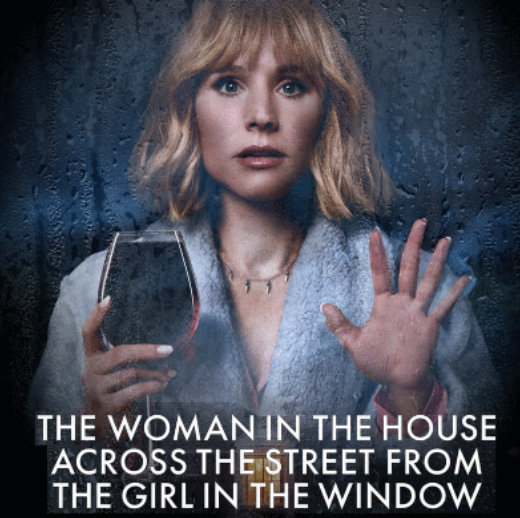The Conservative Critic
Is The Woman Across the Street from the Girl in the Window a good parody?

Recently Netflix released a new mini-series starring Kristen Bell (The Good Place, Veronica Mars) called The Woman In the House Across the Street from the Girl in the Window which is a play on the many similarly titled murder mystery novels which dominate the fiction market and have recently become a stereotype of favorites of suburban women (more on that under the heading “is it liberal?”)
The series is billed as a parody and it definitely has elements of satire but the tone of the show is played sometimes straight but sometimes in spoof in a way that is – intentionally or otherwise – extremely bifurcated leaving viewers to wonder if it achieved at all what it set to achieve in the first place.
The Conservative Critic will ask: Is it entertaining? Does it have artistic/intellectual value? And finally; is it liberal propaganda?
The Conservative Critic Meter Check: The Woman in the Window Across the Street from the Girl in the Window
Overall Rating: Iffy
The Woman Across the Street from the Girl in the Window (The Woman) set off with a basic premise which was to parody the archetype of the crime/murder drama’s heavily prevalent in literature. Unfortunately, the makers of the miniseries lacked an education on the history of crime novels and made the unfunny error of boiling them down to the past time of the stereotype of “bored housewives” and “suburban women.” Not only do the makers seem to have no concept of Jane Austen, Alfred Hitchock, Truman Capote or the other forefathers of the genre but they also feel the need to promulgate sexist tropes against regular American women that only liberals could excuse themselves for.
All jokes can be funny if they’re executed correctly. So the problems with the offensive and uneducated take on classic film and literature genre and women, in general, would have all been totally excusable if it managed to be funny and make sense. Unfortunately, The Woman was not sure what it wanted to be and therefore was unable to achieve either a straight-played satire or a traditional spoof. The effect leaves viewers confused, offended, and a little like they’re missing out on an inside joke.
Ultimately a total trainwreck is avoided by the sheer charm and talent of Kristen Bell who has a long record of making unwatchable content palatable (When in Rome, Bad Moms).
Is it entertaining?
Rating: Watchable
Perhaps from the sheer desire to try and wrap their hands around it, viewers will easily consume the short miniseries. The mystery within the story itself starts out with some strength and misdirection but spirals into the parody in a way that is far too easy to follow to hold much attention. There is a bit of a twist ending but by then the show has turned silly so the twist makes minimal sense.
It’s not a boring show because Kristen Bell is a delight and viewers will be spending a lot of time trying to figure out what is and is not a joke until the story unravels into an obvious lark. But because it doesn’t know who it is it’s really neither fun nor scary so it’s not particularly interesting one way or another.
Does it have artistic/intellectual value?
Rating: Struggles
Viewers could give it some credit for being a format they’ve never seen before except that it becomes clear that it was an accident. The creators seem to feel like they were onto something new and clever by making fun of the murder mystery genre seemingly having forgotten the successful franchise of horror spoof films following Scary Movie. The Scary Movie franchise may be dreadful but they knew what they were and they had a clear identity. The Women attempts to follow in those footsteps but it wants to be a little less spoof and a little more high brow satire. Unlike the extremely well-done Succession and Cabin in the Woods of a similar genre, The Woman makes several mistakes in achieving its funny but serious tone.
First of all, one of the tropes the show attempts to make fun of is how much wine and pills the main character (Kristen Bell’s Anna) takes while obsessing over her neighbor’s life. But instead of making that exaggerated behavior funny, the showrunners chose to give Anna a very tragic backstory and wait far too long to make that tragic backstory at all funny. It’s a bit of a spoiler (but not really this ground is covered in episode 1), but with Anna’s 6-year old daughter has died, it’s kind of hard to think of her drinking and hallucinations and phobias as a farce. The Woman does absolutely nothing to try and lessen the blow of the child’s death until deep into the series when viewers are already emotionally confused.
Issues like the dead child abound through the show and are never fully decided in terms of what is and is not funny. If not for Kristen Bell being naturally charming and deeply talented, the show would have been a total disaster of poorly thought nonsense.
Is it liberal propaganda?
Rating: Weirdly yes
The show is liberal for several reasons. First of all is the belief that one kind of literature is somehow more acceptable and high brow than another kind of literature. This is a thing liberals do a lot and always have because it makes them feel more elitist. The trend ten years ago was to refer to novels written by women and featuring female characters as “chick lit” and relegating the works to a lower status than the works considered more serious. Now the new trend is to mock crime drama because of its easily traceable archetypes and the current trend of a female-dominated readership.
Both of these trends lack literary context and are offensive to women as liberals so often are. “Chick lit” as they called it was not different from the works of Bronte, Austen and Alcott which were also considered “low brow” in their time (re: before suffrage) but later are of course considered some of the greatest literary works in history.
The satirization of sensationalized crime dramas can actually be traced to at least Jane Austen herself who did it with aplomb in Northanger Abby which is one of the great feminist works of her time and also a favorite among female audiences. Pulpy crime dramas have persisted through mockery for many years and when written by men such as the Sherlock Holmes series are considered to be classics. Hitchcock himself adapted the archetypal format for his acclaimed films and no one points to his work and says it’s trash because women like it and he literally wrote a movie called Rear Window and The Man Who Knew Too Much.
So contextually, the genre has successfully promulgated the same exaggerated plot lines and tropes for the better part of 250 years and to criticize a standard of literature that has survived the American civil war, the Russian revolution, the industrial revolution, and both world wars not to mention the turmoil of the last 10 years I would think is a little ambitious and only something a liberal would take on casually without a clear plan of success.
All of this is to say: literature is precious and ancient and it’s rare that a genre was not created from some greatness long before us. No genre is more acceptable to love than another and no one should feel shame for what they enjoy reading.
Further, the idea that suburban women can be so casually boiled down to a caricature (even in the face of unimaginable grief) is truly something only the left can muster the strength for. Sure it’s funny to poke a little fun amongst ourselves about “wine moms” and “Karens” but the whole thing has really gotten out of hand and become the left’s way of saying: women with emotions who live on tree-lined streets or choose to stay home are not valid and their lives don’t matter and they must be so so bored. It’s offensive and it’s targeted at conservative women.
I do have a sense of humor. All of this can be and has been at times extremely funny and done well. But if the joke doesn’t land, it’s just rude. And that’s where The Woman seems to fall.
Conclusion
The Woman Across the Street from the Girl in the Window does not know what it wants to be outside of critical of a beloved genre of literature and a common stereotype of suburban women. It’s not very funny but it’s also not very interesting. If not for Kristen Bell, it would not have made it to a streaming platform at all.
